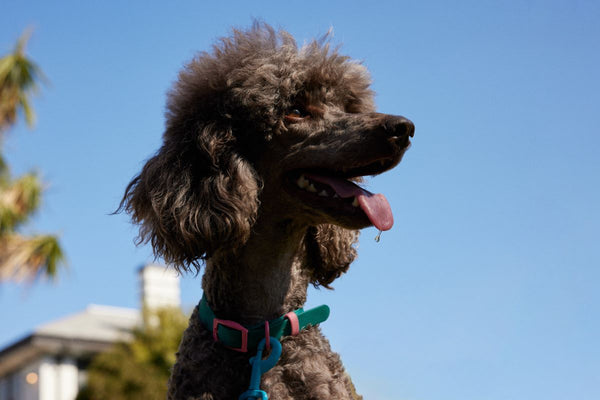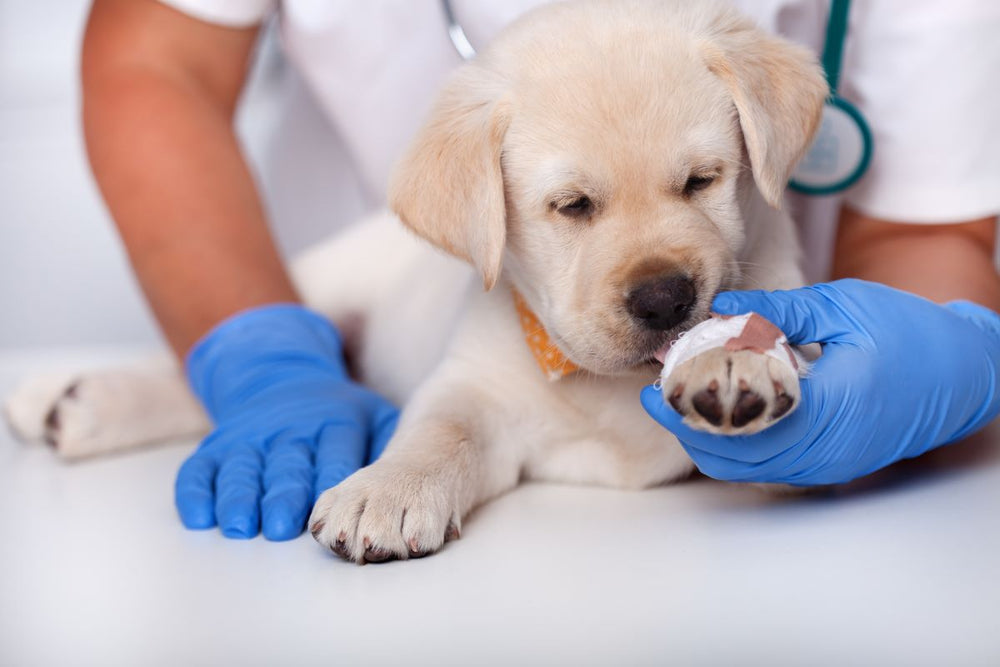By: Dr. Juli, DVM @itsDrJuli
As dog owners, we know our dogs are goofy bundles of unlimited energy, and their boundless excitement can sometimes lead to mishaps. It's likely that at some point in your dog's life, they will have to recover from a wound or surgery. Accidents can happen at any time, and injuries, like a skin scrape, or laceration, are painful and can become infected.
While it may be tempting to let nature take its course and allow your pup's wound to heal naturally, open wounds on your dog's skin are at risk for more severe issues, especially if your dog insists on licking. Caring for a sick or injured pet can be stressful for pet owners, so learning how to prevent wounds from worsening will ensure the best outcome for your four-legged best friend.
Dogs can seem to lick everything, from paws to lips to even the air, and licking their wounds is no exception. It may seem harmless or unpleasant to confront, but it's essential to understand why our pups lick their injuries in case they are suffering from an underlying cause that may need further care.

Why do Dogs Lick Pus?
Oozing, smelly wounds are enough to turn the stomach of pet owners. However, a dog's natural reaction is to lick an injury or surgical site. Licking a wound is a normal, instinctual behavior for your pup. The primary reason dogs lick their wounds is because that is the only tool they have to alleviate their discomfort.
Common reasons your dog licks pus or other wounds include:
- Pain relief. Like humans rubbing a body ache, when your dog licks a wound, it signals the brain and temporarily numbs any wound-related pain. If your pup frequently licks an area with no apparent injury, they may have an underlying problem like joint pain.
- Wound cleansing. Fresh injuries may benefit from your dog licking, which can help remove debris. Your dog's saliva also has antibacterial properties and wound-healing properties (such as capnocytophaga), which can slightly help wound care.
- Obsessive-compulsive disorder (OCD). While the initial reason your dog licks a wound may be to relieve pain and cleanse the area, dogs who suffer from OCD may continue to lick the area obsessively.
What to Do if Your Dog Keeps Licking His Wounds
A few licks over a wound will probably not cause any additional harm to an affected body part or surgical site. However, continued exposure to an injury to your dog's saliva can lead to numerous problems, including dermatitis, reopening a wound, increasing wound size, delayed healing, or a more severe bacterial infection.
Your dog's mouth contains some bacteria which can infect an open wound and allow for the overgrowth of harmful bacteria, which can interfere with the healing process. An infected wound can become abscessed or cause sepsis, a potentially life-threatening infection in severe cases. Bring your dog for immediate veterinary care if they show any of the following signs of infection:
- Redness or swelling of the tissue surrounding the wound
- White, green, or red-tinged discharge from the wound
- Wounds that will not heal
- Hair loss around the wounded skin
- Excessive licking, which has removed a scab or reopened a wound
- Injuries that are getting bigger
- Decreased appetite
- Fever
- Skin that is warmer than other body parts
Is a Dog’s Mouth Cleaner than a Human's Mouth?
A common misconception is that your dog's mouth is cleaner than yours. Like humans, all dog mouths are not created equal. Your dog's saliva contains natural, normal bacteria, which may aid wound healing. While these “germs” are a different type of bacteria than what is found in our mouths, they are not considered dangerous to people in most cases. However, your dog's saliva can cause injuries to become infected.
Additionally, the curious nature of dogs often leads to investigating potentially infectious things with their mouths, including garbage, which may contain spoiled food, dead animals from outside, or feces from other animals. This unpleasant doggy behavior is the perfect formula for passing dangerous bacteria to you or themselves. Always wash your hands or face after receiving kisses from your pup, and never allow them to lick your wounds.
Dental disease can also decrease the cleanliness of your dog's mouth and saliva. Because more than 80% of pets over three years old have some form of dental disease, it's likely your dog's mouth also has increased amounts of oral bacteria. Regular professional cleanings with your DVM, oral health check-ups, and dental chews can help keep your dog's dental disease at bay.

How to Stop Your Dog From Licking His Wounds
Preventing your dog's instinctual behavior to lick their wounds will help accelerate healing and prevent injuries from becoming more infected and painful. Keeping a dog-specific first aid kit at home will allow you to care for minor wounds. However, always check with your veterinarian before using any antiseptic cleaning products or ointments on your dog. Some human first-aid items can be harmful to your pup.
Additionally, most wounds, even minor scrapes or cuts, can be painful for dogs. Bring your pet for a veterinary examination to ensure their injury is appropriately managed; your veterinarian may prescribe pain medication, antibiotics, or anti-inflammatory medication to provide your pup additional relief. Skin-supporting supplements, like Omega Oil, can help your dog's skin cells and coat while healing. If your pet suffers from OCD or anxiety, a calming supplement may help alleviate some stress that may be causing your pup to lick excessively.
Other tools to prevent your dog from licking their wounds include:
- Elizabethan collar. More commonly known as the "cone of shame" or an e-collar, a firm Elizabethan collar will prevent your dog from licking wounds or surgical sites on their body. Ensure the collar extends more than 2 inches beyond the muzzle. Some dogs will not eat with their e-collar on, so monitor them closely during brief periods if you need to remove the plastic cone.
- Soft or inflatable collar. Your shins and furniture may thank you for choosing a softer version of the e-collar since it's more tolerated by most dogs. However, these collars are not always adequate for preventing flexible pups from reaching a wound. Monitor your dog to ensure they can't get to their injury.
- Dog clothing and recovery suits. Pet-specific clothing like t-shirts, dog booties, and recovery suits are available to cover and protect various wound types. Ensure the clothes fit correctly and aren't too tight.
- Wound dressing. Your veterinarian may apply a bandage or wound dressing to prevent your pet from infecting their wound. Never place a bandage on your dog’s wound unless advised by your DVM.

For more information on your dog's health, check out the Native Pet blog.


